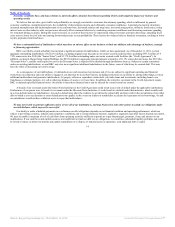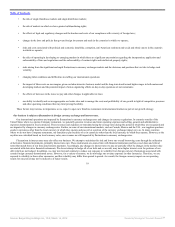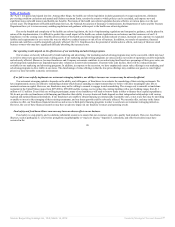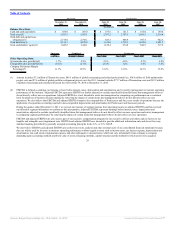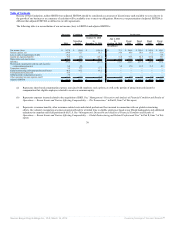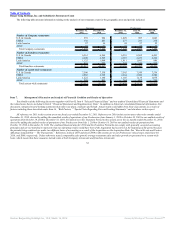Burger King 2011 Annual Report Download - page 24
Download and view the complete annual report
Please find page 24 of the 2011 Burger King annual report below. You can navigate through the pages in the report by either clicking on the pages listed below, or by using the keyword search tool below to find specific information within the annual report.
Table of Contents
We may not be able to prevent third parties from infringing our intellectual property rights, and we may, from time to time, be required to institute
litigation to enforce our trademarks or other intellectual property rights or to protect our trade secrets. Further, third parties may assert or prosecute infringement
claims against us and we may or may not be able to successfully defend these claims. Any such litigation could result in substantial costs and diversion of
resources and could negatively affect our revenue, profitability and prospects regardless of whether we are able to successfully enforce our rights.
Recent public and private concerns about the health risks associated with fast food may adversely affect our financial results.
Class action lawsuits have been filed, and may continue to be filed, against various quick service restaurants alleging, among other things, that quick
service restaurants have failed to disclose the health risks associated with high-fat or high-sodium foods and that quick service restaurant marketing practices
have targeted children and encouraged obesity. Adverse publicity about these allegations may negatively affect us and our franchisees, regardless of whether the
allegations are true, by discouraging customers from buying our products. In addition, we face the risk of lawsuits and negative publicity resulting from illnesses
and injuries, including injuries to infants and children, allegedly caused by our products, toys and other promotional items available in our restaurants or our
playground equipment. In addition to decreasing our revenue and profitability and diverting our management resources, adverse publicity or a substantial
judgment against us could negatively impact our business, results of operations, financial condition and brand reputation, hindering our ability to attract and
retain franchisees and grow our business in the United States and internationally.
Changes in governmental regulations may adversely affect restaurant operations and our financial results.
In the United States, each of our Company and franchise restaurants is subject to licensing and regulation by health, sanitation, safety and other agencies in
the state and/or municipality in which the restaurant is located. State and local government authorities may enact laws, rules or regulations that impact restaurant
operations and the cost of conducting those operations. In many of our markets, including the United States and Europe, we are subject to increasing regulation
regarding our operations, which may significantly increase our cost of doing business. In developing markets, we face the risks associated with new and untested
laws and judicial systems. Among the more important regulatory risks regarding our operations we face are the following:
• the impact of the Fair Labor Standards Act, which governs such matters as minimum wage, overtime and other working conditions, family leave
mandates and a variety of other laws enacted by states that govern these and other employment matters;
• the impact of immigration and other local and foreign laws and regulations on our business;
• disruptions in our operations or price volatility in a market that can result from governmental actions, including price controls, currency and
repatriation controls, limitations on the import or export of commodities we use or government-mandated closure of our or our vendors’ operations;
• the impact of the United States federal menu labeling law which requires the listing of specified nutritional information on menus and menu boards
on consumer demand for our products;
• the risks of operating in foreign markets in which there are significant uncertainties, including with respect to the application of legal requirements
and the enforceability of laws and contractual obligations; and
• the impact of costs of compliance with privacy, consumer protection and other laws, the impact of costs resulting from consumer fraud and the
impact on our margins as the use of cashless payments increases.
We are also subject to a Federal Trade Commission rule and to various state and foreign laws that govern the offer and sale of franchises. Various state and
foreign laws regulate certain aspects of the franchise
23
Source: Burger King Holdings Inc, 10-K, March 14, 2012 Powered by Morningstar® Document Research℠



